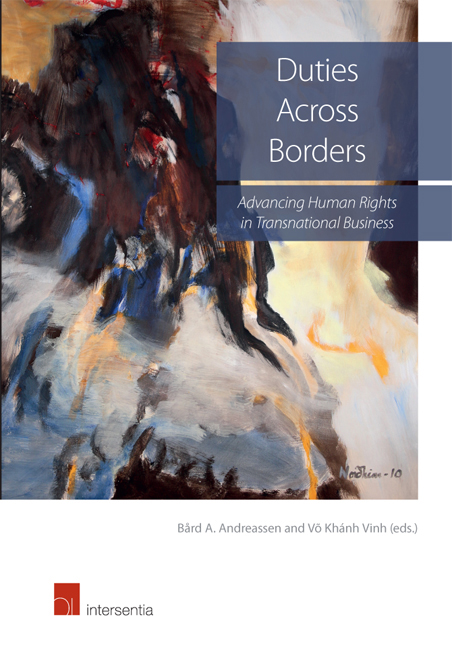Book contents
- Frontmatter
- Preface
- Contents
- List of Authors
- List of Figures and Tables
- Introduction. Business’ Duties Across Borders: The New Human Rights Frontier
- Part I. Conceptual Developments
- Part II Contextual Issues
- Part III Sites Of Regulation
- Chapter 10 Human Rights and Business. An Assessment of the Responsibility of the State in Vietnam
- Chapter 11 Investment Treaties and Human Rights. Reflections from Mining in Latin America
- Chapter 12 Beyond State Duty and Corporate Responsibility. Human Rights in Industrial Zones in Vietnam
- Chapter 13 The Application of the UN ‘Protect, Respect and Remedy’ Framework to State-Owned Enterprises. The Case of the State Oil Company SOCAR in Azerbaijan
Chapter 13 - The Application of the UN ‘Protect, Respect and Remedy’ Framework to State-Owned Enterprises. The Case of the State Oil Company SOCAR in Azerbaijan
from Part III - Sites Of Regulation
Published online by Cambridge University Press: 21 September 2018
- Frontmatter
- Preface
- Contents
- List of Authors
- List of Figures and Tables
- Introduction. Business’ Duties Across Borders: The New Human Rights Frontier
- Part I. Conceptual Developments
- Part II Contextual Issues
- Part III Sites Of Regulation
- Chapter 10 Human Rights and Business. An Assessment of the Responsibility of the State in Vietnam
- Chapter 11 Investment Treaties and Human Rights. Reflections from Mining in Latin America
- Chapter 12 Beyond State Duty and Corporate Responsibility. Human Rights in Industrial Zones in Vietnam
- Chapter 13 The Application of the UN ‘Protect, Respect and Remedy’ Framework to State-Owned Enterprises. The Case of the State Oil Company SOCAR in Azerbaijan
Summary
In recent years, the concept of corporate social responsibility has gradually developed as a tool to incorporate a social perspective, including the respect for human rights, within business operations. The UN Guiding Principles on Business and Human Rights (the UNGP), adopted in 2011, set global standards for the accountability of both corporate actors and states for their human rights impact. Amidst calls for increased regulation of corporations given the risk of human rights violations through their activities, questions have arisen as to the regulation of state-owned enterprises. Presence of state ownership leads to a general conception that such enterprises entail stronger potential to achieve comprehensive human rights observance than ones of the private ownership. More importantly, it is suggested that commitment to and respect for human rights by state enterprises requires them to enact and incorporate human rights policies. Yet, in spite of the principle of state respect, the main puzzle addressed in this chapter is: what impact do the UNGPs have on state-owned enterprises in countries experiencing bad governance without basic principles of separation of powers, respect for civil and political freedoms, transparency and accountability?
This chapter examines the corporate social responsibility of the State Oil Company of the Republic of Azerbaijan (SOCAR) and its obligations regarding its human rights impact through the prism of the principle of the state duty to respect and protect human rights as described in the UNGPs. Particularly, it focuses on violations of property rights occurring in the oil-rich areas of Azerbaijan, where SOCAR claims ownership for the use of oil extraction, and SOCAR's human rights due diligence. The key concern of the article is how to secure the protection of property rights in extractive industries. This is primarily addressed through the analysis of all three pillars of the UNGP framework; however most emphasis is on pillar three which obligates the Azerbaijani government to provide effective remedies to victims of property expropriation. The chapter analyses SOCAR's human rights responsibilities as a state-owned enterprise, the underlying hypothesis being that Azerbaijan enjoys and exerts full power over the company to prevent and redress any human rights violations committed by SOCAR. The chapter discusses the extent to which such responsibilities can be embedded in SOCAR given Azerbaijan's ownership of the company and the government's poor human rights record.
- Type
- Chapter
- Information
- Duties Across BordersAdvancing Human Rights in Transnational Business, pp. 301 - 322Publisher: IntersentiaPrint publication year: 2016

